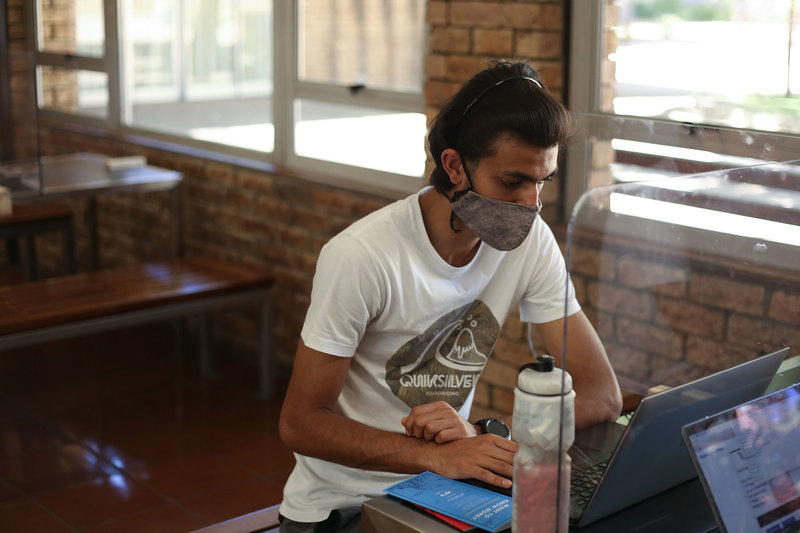Goal Buddy: debut challenge for res students during winter vac
16 July 2021 | Story Helen Swingler. Photo Je’nine May. Read time 3 min.
COVID‑19 will see the University of Cape Town’s (UCT) students in residence remaining on campus during the winter vacation for the first time. To counter the enervating effects of lockdown, UCT’s Residence Life team has introduced Goal Buddy, an optional 30‑day motivational programme.
At the time of writing there were already 500 students signed up for the programme, which begins on 21 July.
This pilot programme is aimed at both undergraduate and postgraduate students. During the challenge, each participant will choose a personal goal, and work towards actualising it over 30 consecutive days. The “buddy” part is that they will share their daily progress, or journey, with another participant: their Goal Buddy, explained Sean Abrahams, the senior coordinator for learning and innovation in the Residence Life division of the Department of Student Affairs.
These goals should be attainable, but should stretch the students as individuals, said Abrahams.
Each participant will be paired with and then introduced to their Goal Buddy online, and agree on how they want to connect online. They then share a daily mini-goal, an anticipated obstacle and a plan to overcome it, and the outcome.
Goal‑minded
“We’re using a WOOP (wish, outcome, obstacle, plan) framework for the challenges. This [programme] is based on the well‑researched, academically published and internationally recognised framework of Mental Contrasting with Implementation Intentions, commonly known as WOOP,” said Abrahams.
UCT residences already use the WOOP Study Buddy and Writing Buddy programmes.
“Giving students a daily platform through which to engage in goal-directed behaviour and goals aligned with their own interests is immensely powerful.”
Goal Buddies will be briefed on how this goal‑setting tool works and how to apply it. They will also have access to the free WOOP app, which has now been translated into isiXhosa and isiZulu.
“For the first time, we’ve created a flexible option in which students can select their own goals, and meaningfully and regularly engage and grow with a fellow student on a daily basis,” said Abrahams.
“Giving students a daily platform through which to engage in goal‑directed behaviour and goals aligned with their own interests is immensely powerful.”
At the end of the 30 days, students will be able to evaluate their experience of the programme against the Goal Buddy learning outcomes, via Google Forms. (Students remain anonymous during this process.)
Abrahams said that the learning outcomes were researched and critically examined against the theoretical framework of “grit”, defined by the University of Pennsylvania’s Professor Angela Duckworth as “passion and perseverance towards the attainment of a long‑term goal”.
“The ability to develop one’s capacity to sustain interest and perseverance over a long period of time is arguably critical to not only academic success, but life trajectory beyond the university,” Abrahams added.
“We need to provide as many opportunities to allow for such goal‑directed deliberate practice as possible.”
To be more inclusive, the programme has capacity to invite the larger student university community to participate.
 This work is licensed under a Creative Commons Attribution-NoDerivatives 4.0 International License.
This work is licensed under a Creative Commons Attribution-NoDerivatives 4.0 International License.
Please view the republishing articles page for more information.










